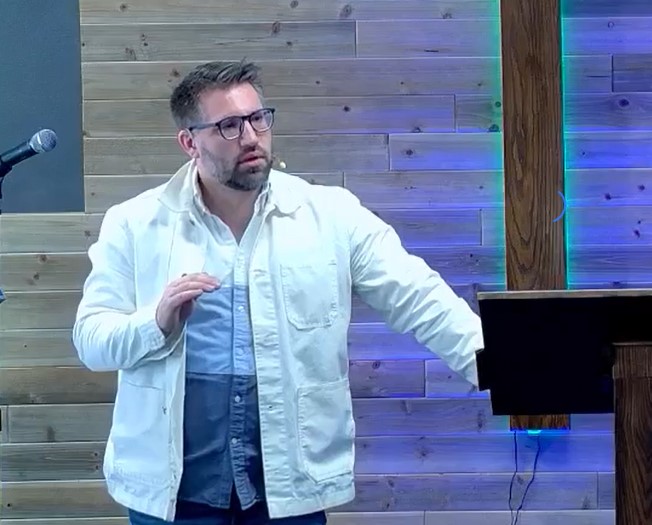Welcome to this week’s online youth group lesson. Catch up with previous lessons here.
We’ll kick off with this music video from Gary LeVox:
Today’s lesson is more of an open discussion situation than an absolute “you should do this, you shouldn’t do that” focus. The topic … how to deal with difficult people.
Many “new age” Christians suggest completely purging our lives of people we consider negative. Those individuals, such as Joel Osteen, preach that we should be happy first, and those that we find abrasive and negative take away that happiness. He touches upon that in this video:
His opening line … for every peace-stealer we let in our lives, we are 20 percent more likely to live stressed, on edge, to have a crisis. I have no idea where he gets this statistic from, or how reliable it is, but he uses it to suggest that we should seek out happy friends. He does admit in this video that he isn’t suggesting we completely shut out the negative people in our lives — but he does insinuate that in other messages and writings he shares.
The concept of being careful with the company we keep is a Biblical one in root. In 1 Corinthians 15:33 (NIV), Paul warns that: “Bad company corrupts good character.”
In the book of Proverbs, which is chock full of important life lessons, we learn in Proverbs 22:24-25 (NIV):
Do not make friends with a hot-tempered person,
do not associate with one easily angered,
or you may learn their ways
and get yourself ensnared.
The common denominator in this advice is to show caution in being around people that may cause us to stumble into sin. The visuals of how cautious we should be can be seen in Matthew 5:29-30 (NIV):
If your right eye causes you to stumble, gouge it out and throw it away. It is better for you to lose one part of your body than for your whole body to be thrown into hell. And if your right hand causes you to stumble, cut it off and throw it away. It is better for you to lose one part of your body than for your whole body to go into hell.
This is all important to consider … and as teenagers, if you find yourselves feeling tempted by someone who is constantly breaking rules, pushing drugs or doing things that you know are outright against what is Godly, you should create a boundary there … because it is a matter of sinning vs staying pure … NOT because it makes us feel more happy, less stressed or better about ourselves.
A friend recently shared a link of an article that talks about a fine line in this way of thinking in how we deal with negative people. You can read the full story here.
To pull from his column, he confronts some of the message behind Osteen’s (and similarly focused Rachel Hollis) intentions behind cutting out negative people in our lives:
“They teach that we need to reject and avoid people who cause us to feel negative emotions or think negative thoughts. Why? Because according to the principles of positive thinking, our thoughts are the power that change and shape the world around us. To get ahead in life we need to get rid of anyone who holds us back.”
The writer of this column, Tim Challies, then shares three major reasons why he struggles with this mentality:
It’s narrow-minded: “It is the kind of platitude easy to repeat and enact when you’re firmly established in upper-middle class America. It assumes you can determine whom you will be surrounded with and remove anyone who may be having a negative effect on you. It also assumes you have the ability and income to change your surroundings–to move homes, to renovate the office space, to buy some new furniture–if you determine yours are not fostering positivity. Yet if a principle is true, it is true in every time and every place. This principle is simply not true as we elevate our gaze from wealthy California suburbia to third-world slums. It tacitly indicates that only the privileged few can be successful because only they have the power, authority, or means to replace negativity with positivity.”
It’s selfish: “It assumes you have the right and ability to judge other people primarily by whether they help or hinder your success. It pushes away the very people you may be best positioned to help. It diminishes the humanity of people you’ve determined to be negative influences by giving you permission to reject them. It assumes that you are a positive influence on others and always have been. Looking at your own life, how many people who were godlier, more positive, and more successful invested in you even when you were weak and immature and full of negativity? This principle is horrifically self-centered.”
It’s unbiblical: “The very heart of the gospel is the incarnation of Jesus Christ. This perfect God became man and came to dwell among hopeless, angry, negative people; he left the perfection of heaven to dwell on the broken, negative space called earth.”
Challies goes on to talk more about Jesus and who He chose to surround Himself with, who He came to minister to.
With this line of thinking, we know that Jesus had the will power to not let the negative people trip Him up to sin. That is the important boundary line, the variable that we should factor into each of our decisions on who we associate with.
In closing … speaking as me (John), there have been many times where I have needed to deal with people who are extremely negative, who are hard to be around because they gossip about others, complain all the time, etc. God has used some of these relationships to help me learn more about me, to give me important perspective and to provide unexpected ministry moments.
So before we completely ice out someone from our life — someone who God may have put there for a reason — we need to be careful in the reasons behind that move. Are we simply trying to make ourselves feel better or avoid a stressful, uncomfortable situation, or do we need to keep our distance because this person likely will cause us to cross a line we know we shouldn’t cross?
What do you think? Again, this lesson is developed to start a conversation more than to suggest an absolute truth.













